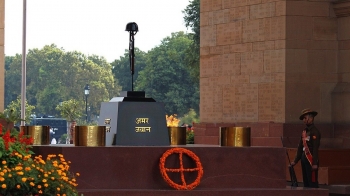
.png) Dr Suresh Mathew
Dr Suresh Mathew

“One cannot and must not try to erase the past merely because it does not fit the present,” said Golda Meir, the first woman Prime Minister of Israel, a country with hundreds of years of beleaguered past, but survived every threat to its existence without erasing the past. India is passing through a troubled period in the last few years with a government focusing on rewriting not only its medieval history but even the immediate past. The purpose of such preposterous attempts is to weave a history that would gel with its proclaimed ideology and political vision. The latest move to put out the Amar Jawan Jyoti at the India Gate in Delhi and merge it with the flame at the nearby National War Memorial exposes the government’s apparent allergy to anything connected with the previous Congress regimes.
The presence of Amar Jawan Jyoti close to India Gate was significant in many respects. The Jyoti was lit by Indira Gandhi in 1972 in the wake of India’s victory in 1971 India-Pakistan war as a tribute to the soldiers who gave up their lives. But it is significant that it came up close to the canopy of India Gate which is a memorial to 90,000 soldiers of the British Indian Army who died in the World War I. Thus, the Jyoti, for the public mind, was a tribute to innumerable Indian soldiers who laid down their lives for the country, without bracketing them into a particular period. It evoked patriotism; it choked one with nostalgia; and it became part of people’s emotion.
The National War Memorial with its flame, on the other hand, is built to commemorate the soldiers who died fighting for the Independent India. It has no mention of the sons of India who gave up their lives before Independence. Hence, there is more to the shifting of Amar Jawan Jyoti than meet the eyes. Initially the government had decided to keep both the flames burning, but later changed its mind with lame duck excuses. A more probable reason could be that the war memorial opened by Prime Minister Narendra Modi could not match the Amar Jawan Jyoti lit by Indira Gandhi, in the eyes and hearts of the people.
The decision to drop the song Abide With Me, a tune played during Beating Retreat ceremony, a highpoint of the conclusion of the Republic Day celebrations, is yet another instance of Modi government’s bizarre bid to wipe out yet another sentimental piece from the post-independence era. Axe has fallen on the hymn, a favourite of Gandhiji, apparently as part of the government’s effort to ‘Indianise’ the ceremony; ironically it did not bother the powers-that-be that many tanks and jets which took part in the Republic Day parade had foreign markings. One should read this development along with Modi’s inauguration of a hologram statue of Subhas Chandra Bose under the grand canopy near India Gate and the announcement that soon a granite statue of Bose would be installed in the same place. It seems a grand plan is afoot to ‘discredit’ the Congress era and water down the role of Mahatma Gandhi as the central figure of the national freedom movement. The re-construction of the past to give legitimacy to a new history on the ‘Hindutva lines’ seems to be the thrust of the present regime.